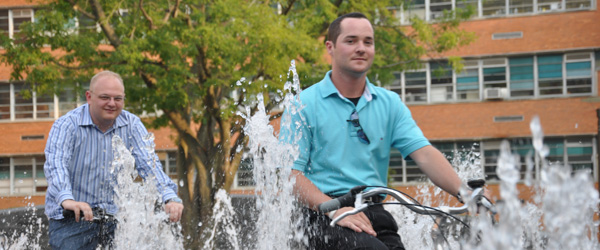 story by Marilyn S. D’Angelo
story by Marilyn S. D’Angelo
Ever since its first iteration in the 1960s, bike sharing has been a bit of an idealistic campaign. It sounds great, sure. But in reality, bike sharing systems often lead to underutilized, vandalized and stolen bikes—keeping overhead high and program initiation low. Now, one local company is using innovative software to change the economics of this sought-after city asset. ¶ Recent advances in technology have already made bike sharing much more realistic—GPS tracking, cell phone unlocking mechanisms and credit card payment systems are now as simple as remembering the combination to a Masterlock. And yet, with the exception of a few choice U.S. cities (Washington, DC, Denver, Minneapolis and South Beach in Miami), the systems have still been slow to take off.
Overhead remains the essential issue—a tough sell to city officials in lean times—but CityRyde, a Philadelphia start-up, has developed a software program that should help bike share companies turn a profit. The key lies in monetizing the amount of carbon offset by the bikes—literally putting a price tag on going green.
The entrepreneurs behind this green-makes-green software are CityRyde co-founders Timothy Ericson and Jason Meinzer. After a semester abroad in London, the Drexel grads returned to the States with a plan. “We wanted to make bike share proliferate worldwide,” recalls Meinzer.
In 2007, the duo launched CityRyde. For the next year, the team worked on raising investment capital and attempted to develop its own hardware. But, with a struggling economy and other systems already available, CityRyde eventually transitioned to consulting. Ericson and Meinzer remade themselves as the go-to authorities on bike sharing for a country in dire need of such a resource.
This year, CityRyde finished the first of two branded software packages, dubbed CityRyde Spark. This universal program was the first off-the-shelf software for managing bike share systems. The software can be applied to any pre-existing bike share hardware (which includes the bikes and current technology systems). It’s now in use at the University of Chicago and the University of Colorado. By year’s end, it will be launched at four other universities, and in 2011, the technology comes to Boulder County, CO.
Next up is City Ryde’s Inspire, a program built on top of Spark’s universal technology. This is the software that proves bike sharing is displacing a carbon-emitting ride. “Our software produces reports, runs the algorithms, verifies, certifies and monetizes carbon offsets,” said Meinzer. “It is the only software that claims to do this for sustainable transport projects like bike sharing.”
These carbon offset credits are then sold as commodities on the open carbon offset market, the world’s fastest growing commodities market. As with any publicly traded commodity (soy beans, coffee, gold), the price is based on supply and demand. Large corporations—including giants like Google—purchase these credits, offsetting their emissions for the year. Carbon offset credits come with different values depending on where they were gleaned. Because of the human health benefits associated with bike riding, bike share credits are ranked at the top of the value scale.
According to the Gold Standard, a Swiss nonprofit organization that operates a certification program for carbon credits, “offsets by themselves do not lead to a net reduction in global emissions, although they can prevent the rate of emissions from increasing.”
CityRyde’s Inspire is currently in its beta testing stage. The next step is to bridge the $350,000 financial gap and bring the product into alpha testing stages, and then to its final enterprise-grade product stage.
As cities across the country continue to look into alternative modes of transportation and Philadelphia vies for its “Greenest City in America” title, software like this could make or break the city’s ultimate decision on bike sharing.
Philadelphia has been looking into launching a program since 2007. After years of studies, an official report has just been released showing that bike sharing could be feasible in our fair city—there is talk of a 2011-2012 launch. On the day that happens, the program will be able to look locally for software.


